A Twitter Chat, or TweetChat, is a real-time Twitter event focused around a specific topic. It’s a chance to learn from industry subject matter experts and interact with people with similar interests in an informal way. Co-hosted by Kickapoo Joy Juice, our Indie Dev Extravaganza Twitter Chat featured six indie studios. This article is a recap of our Twitter Chat and highlights the thoughts and expertise of those who participated.
The Participants
Salmi Games
Based in Munich, Germany, Salmi Games recently released Ellipsis. Yacine Salmi, one half of the two-man team, represented Salmi Games and gave us some great advice. The game is available for purchase for iOS and Android.
Trouble Impact
Located in Austin, TX, Cat Musgrove and Issam Khalil are working on a release version of Color Thief. For more information, check out this interview with Trouble Impact.
Fat Panda Games
Located in Mérida, Yucatán, Mexico, Fat Panda Games has created multiple titles including Flat Kingdom (available for purchase on Steam for Mac and PC) and Lobo with Shotguns. Gerardo Garcia, Director of Fat Panda Games, joined us to answer some questions.
Clockwork Giant Games
Based in Madison, WI, Clockwork Giant Games is currently working on Vulpine. The game was successfully Greenlit by the Steam community and is now on Kickstarter.
Fishing Cactus
Located in Mons, Belgium, the Fishing Cactus team has created multiple games and recently released Epistory: Typing Chronicles — now available for purchase on Steam. Sophie Schiaratura, Fishing Cactus’ PR manager, joined us to chat.
Frogdice Studios
Based in Lexington, KY, Frogdice Studio has created multiple games, including Threshold RPG. They are currently working on Stash, a new spin on MMORPGs. Michael Hartman, CEO of Frogdice, joined us for his second Twitter Chat.
The Inside Scoop
Q1: If you’re moving from a job career with lots of coworkers, the switch to indie dev can be lonely. @IssamKhalil and I… (1/?) #GSWriterChat
— Cat Musgrove (@Cat_Musgrove) August 25, 2016
…work together, but we still make an effort to go out and interact with people on a regular basis. We do indie meetups & work with other indies at coffee shops. Stay social or you will have issues, especially if you’re an introvert! (Personally, working alone so much gave me BIG problems with anxiety, so I know this one from experience.)
A1: Most indies don’t turn a profit let alone break even. It’s a tough business. #gswriterchat https://t.co/HtPE81Gw8E
— Ellipsis Game (@EllipsisGame) August 25, 2016
A1: Lots of indies are financially supported by other people, or they do contract work. Savings don’t last! 1/2 #GSwriterchat
— Issam Khalil (@IssamKhalil) August 25, 2016
Indies’ success story have a rose tinted glasses vision of how they succeeded (“Work hard”)
.@GameSkinny It´s a constant train of emotions, both good and bad between the dev with his team, with his audience and himself #gswriterchat
— Flat Kingdom (@FlatKingdom) August 25, 2016
A1: Once you begin development, you’ll never be able to look at games the same way again… (1/2) #gswriterchat
— Clockwork Giant (@clockworkgiant) August 25, 2016
…without noticing small technical details and trying to reverse engineer everything.
@clockworkgiant This even happened to me just from Web Development. It all makes much more sense than being a kid enjoying games blissfully.
— Brian Schaaf (╭ರ_•́) (@Rothalack) August 25, 2016
“Haha yeah Ruins a bit of the mystery when you notice the tricks of the trade. Still hasn’t kept me from enjoying a game though :)” – Clockwork Giant
A1: It is extremely hard to make money/break even from indie games. #gswriterchat
— Michael Hartman (@Muckbeast) August 25, 2016
A2: Nobody knows about you and your awesome game, so you have nothing to loose #gswriterchat
— Epistory (@epistorygame) August 25, 2016
Also don’t forget the last 10% takes 90% of the effort :p
.@GameSkinny Don´t make a copycat of another game, look for inspiration in other media, like theater, movies or science. #gswriterchat
— Flat Kingdom (@FlatKingdom) August 25, 2016
A2: Start small, do game jams, work your way up. Find communities to help you learn like /r/gamedev/. #gswriterchat
— Clockwork Giant (@clockworkgiant) August 25, 2016
Q2: If you want to make a game, just do it! Nothing is stopping you from making games in your free time. There are a lot… (1/?) #GSWriterChat
— Cat Musgrove (@Cat_Musgrove) August 25, 2016
…of free game engines, and some of it don’t even require that you know how to program. If you’re past that stage and want to go full time, have a plan for where your livelihood is going to come from because it’s extremely unlikely that you’ll make money from your first (maybe any???) of your games.
A2: Networking is really important, from the beginning try to meet other people in the industry 1/5 #GSwriterchat
— Issam Khalil (@IssamKhalil) August 25, 2016
Learn how to do your own accounting/taxes, knowing the flow of your money is critically important. “Tax deductible” does not mean it’s OK to spend the money. Learn how to program, either C++ or C#. It’s hard to learn from scratch, but you need that basic knowledge. Learn how art/design work, what tools are used, what are the rules. Get knowledge to offer constructive criticism.
A1 #gswriterchat https://t.co/wb1c40ipW1
— Ellipsis Game (@EllipsisGame) August 25, 2016
A3: Get a polished demo of the first 40 levels out early and then decide whether to continue #gswriterchat
— Ellipsis Game (@EllipsisGame) August 25, 2016
A3: Start networking before leaving your day job. Go to conventions, local meetup, game jams. 1/3 #GSwriterchat
— Issam Khalil (@IssamKhalil) August 25, 2016
Don’t do premium mobile games from the start, the amount of work to get noticed cost too much initially. Don’t listen to indie success stories, look for indie’s failure and try to learn things to avoid.
A3: Communicate more, being closer to people earlier, networking is as important as making the game #gswriterchat
— Epistory (@epistorygame) August 25, 2016
A3: Unity was the right choice to have made back in the day. Now there are plenty of resources and tools to help make a game #gswriterchat
— Clockwork Giant (@clockworkgiant) August 25, 2016
Take some time to polish up a prototype or two. It’s great practice for becoming better at presentation and usability!
A3: Budget more money, a lot more money, for marketing. #gswriterchat
— Michael Hartman (@Muckbeast) August 25, 2016
Q3: Like I said before, stay social! Put in the time &effort to maintain the friendships that you have, b/c it’s harder… (1/?) #GSWriterChat
— Cat Musgrove (@Cat_Musgrove) August 25, 2016
…to meet new people when you’re working at home. You can even start meeting other indies @ local events before you start.
A3: Don´t start with a game that takes two years! Make some little games, before committing to something bigger. https://t.co/YhAIDoiGRG
— Flat Kingdom (@FlatKingdom) August 25, 2016
A4: Luckly this hasn’t happened to us yet. However, We’d communicate to our fans as clearly as possible when we have a (1/2) #gswriterchat
— Clockwork Giant (@clockworkgiant) August 25, 2016
…setback. Making sure they know why it happened and what we’re going to do about it for the future.
Setbacks are new foundations of success. Yeah! I’m a walking motivational poster! #gswriterchat pic.twitter.com/ZsHNwO0nn2
— Stephen Johnston (@GLStephen) August 25, 2016
Q4: Our schedule has always been pretty loose, so we haven’t had to deal with delays yet. That said… (1/?) #GSWriterChat
— Cat Musgrove (@Cat_Musgrove) August 25, 2016
We do our best to make sure we’re ok money-wise & we’re not sinking into debt as we take longer on the game. We also stay as as open as possible with our followers about what’s going on.
A4: By being transparent with them and telling them that we need time to compensate. https://t.co/OLagaXUfur
— Flat Kingdom (@FlatKingdom) August 25, 2016
@FlatKingdom A4: When dealing with people you are looking to influence in one way or another, I think transparency is key. #gswriterchat
— Emma Spalding (@skoggyuk) August 25, 2016
Communicate early about delays and manage expectations. For the team, keep things clear (schedule & priorities). (1/2) #gswriterchat
— Epistory (@epistorygame) August 25, 2016
A4: For supporters: transparency wherever possible. We don’t commit to anything publicly before we are sure we can meet it. #gswriterchat
— Ellipsis Game (@EllipsisGame) August 25, 2016
A4: We don’t bet on finishing on a specific date, we expect delay and take that into account when looking for contract work. #GSwriterchat
— Issam Khalil (@IssamKhalil) August 25, 2016
A4: constantly maintain & update timeline of milestones. Use social media & forums to keep players as up to date as possible #gswriterchat
— Michael Hartman (@Muckbeast) August 25, 2016
A5: work life balance is important to maintain motivation. Set achievable goals and celebrate them. #gswriterchat
— Michael Hartman (@Muckbeast) August 25, 2016
Q5: The #1 best way to stay motivated is to get our game out there and actually watch people playing it. It’s so easy to (1/?) #GSWriterChat
— Cat Musgrove (@Cat_Musgrove) August 25, 2016
…get tunnel-vision when you’re developing something for so long, and start to question everything. When you actually see people playing it, it’s a reminder of why you’re putting in so much time, & that people actually want to play it. My other answer is setting short term goals. Again, b/c we’ve been working on the game for so long, it can feel like this big, amorphous blob – but breaking it down into small parts makes it feel much more manageable.
A5: We love what we do. When it’s is difficult, I tell them that it´s just the challenge. Time forges your courage. https://t.co/98b9NjQc7M
— Flat Kingdom (@FlatKingdom) August 25, 2016
A5: our game is awesome, they just don’t know it yet! #gswriterchat
— Epistory (@epistorygame) August 25, 2016
A5: Going to conventions and seeing people playing our game. It always lift your spirit when people enjoy your work. 1/2 #GSwriterchat
— Issam Khalil (@IssamKhalil) August 25, 2016
Adding some polish to the game, like a better UI, helps a lot. It allow you to start visualizing the end.
A5: Sometimes, as counter-productive as it seems, taking a break and stepping back to gain some perspective on things helps. #gswriterchat
— Clockwork Giant (@clockworkgiant) August 25, 2016
A5: It also helps to take a break and focus on something more enjoyable for a short while (like prototyping new ideas). #gswriterchat
— Ellipsis Game (@EllipsisGame) August 25, 2016
A5: I hear cupcakes and good whiskey can go a long way…. (or am I speaking from personal experience?) #gswriterchat
— Auverin Morrow (@auverin) August 25, 2016
A6: We support our fans through open development; always letting them know what’s going on, and listening to their (1/2) #gswriterchat
— Clockwork Giant (@clockworkgiant) August 25, 2016
…feedback. We try to foster community by giving them a place to share ideas, enthusiasm and fanart.
A6: We try to make them part of the game, we always ask for opinions about the enemies, or dynamics. https://t.co/2X13IwHo0P
— Flat Kingdom (@FlatKingdom) August 25, 2016
Yeah fanart! And fanfiction. Well, fan anything. #gswriterchathttps://t.co/JFhTnnLlIu
— Ryn (@BusinessLioness) August 25, 2016
A6: We are always open to answer questions from anyone, at conventions, twitter or by emails. 1/2 #GSwriterchat
— Issam Khalil (@IssamKhalil) August 25, 2016
We work with Let’s Player that are fans, giving them an early access and answering questions during their stream.
Q6: So far, our experience with community building has been through bringing the game to conventions. (1/?) #GSWriterChat
— Cat Musgrove (@Cat_Musgrove) August 25, 2016
Since we’re in Austin, there are a lot of local events and we’ve started to recognize some players &build a relationship. All of our streamers so far have been people we’ve met at conventions! We also keep a dev blog that we update weekly. (Although the blog is a little hard to find unless you’re looking for it – I’d like to make it easier to stumble upon.)
A6: listen, obey and if you can’t, let them know gently. *Stay positive* #gswriterchat
— Epistory (@epistorygame) August 25, 2016
A6: For super fans, we try to return the kindness. Random small gifts, early access and listening to feature requests. #gswriterchat
— Ellipsis Game (@EllipsisGame) August 25, 2016
That’s what the super secret newsletter is for. 😀
A7: Alpha is alpha, there will be bugs! #gswriterchat
— Epistory (@epistorygame) August 25, 2016
A7: Whatever the developer presents as a caveat. Unfinished games are unfinished but they can still be polished. #gswriterchat
— Ellipsis Game (@EllipsisGame) August 25, 2016
But basically just try to be fair.
Q7: Be forgiving. Pay more attention to the overall idea & less attention to things like controls or pacing, b/c those (1/?) #GSWriterChat
— Cat Musgrove (@Cat_Musgrove) August 25, 2016
…can change. If you like the idea but the execution is a little lacking, consider giving the game another chance.
A7: When previewing, keep in mind that the game polish has not happened yet. 1/7 #GSwriterchat
— Issam Khalil (@IssamKhalil) August 25, 2016
It’s the same for a AAA game but for an indie game it will look a lot more rough. Try to preview the gameplay mechanic, the experience that the game is trying to offer. Is it something that will be new, that is worth the time to discover? When reviewing, keep in mind that indies game are not targeting the mass market, they are trying to offer a new experience that is currently not served by the AAA studios. In that way, focusing on the new experience should be what’s important, versus things expected of AAA games.
A7: Indie games are built from small budgets, small teams and good ideas. (1/2) #gswriterchat
— Clockwork Giant (@clockworkgiant) August 25, 2016
This often makes them less featured than AAA games, but it allows them to be more unique.
A7: that the best feedback they can give is how the game was entertaining or fun in ways that weren’t advertised #gswriterchat
— Riveted Games (@ArkisVir) August 25, 2016
A7: judge the game by what it is trying to be, not what you arbitrarily wish it was. #gswriterchat
— Michael Hartman (@Muckbeast) August 25, 2016
A7: It´s important to make an accurate review rather than looking to destroy it because it´s “early access”. https://t.co/Wd4gSHuHT3
— Flat Kingdom (@FlatKingdom) August 25, 2016
A7: As a reviewer myself I just want to give constructive feedback. No matter how big or small, it must always be constructive #gswriterchat
— Pierre Fouquet (@SpazldRust) August 25, 2016
A8: Just sharing as much as possible is very helpful. Champion the games that you like and tell people about them. #GSWriterChat
— Cat Musgrove (@Cat_Musgrove) August 25, 2016
A8: Interviews are a great way to get across ideas from the game, and that the devs are actual people… (1/2) #gswriterchat
— Clockwork Giant (@clockworkgiant) August 25, 2016
…As well as inviting indie devs to give their perspective on current events.
Q8: talk about it in the inner circle of reviewers/youtubers #gswriterchat
— Epistory (@epistorygame) August 25, 2016
A8: They help to show the strengths and weaknesses of your game, they are important sources of feedback. (1/2) https://t.co/g0ZkpNZcZa
— Flat Kingdom (@FlatKingdom) August 25, 2016
As a developer, don´t just turn yourback on reviews, but learn to listen the ones that matter.
A8: As a writer you have the skill to express how the game make you feels better than we can. 1/2 #GSWriterChat
— Issam Khalil (@IssamKhalil) August 25, 2016
A8: If a writer chooses *not* to review a game, drop a line and say why. Then devs can adjust their strategy next time #gswriterchat
— Riveted Games (@ArkisVir) August 25, 2016
“This applies to Streamers and YouTubers with Press Kits as well. Even if it’s just saying that a game is ‘not your style’ to show.” – @ArkisVir
A8: Get the word out! No point in just reviewing when others won’t hear about it! Network, chat, talk! #gswriterchathttps://t.co/UVzYtbI1OO
— Emma Spalding (@skoggyuk) August 25, 2016
A8: stories about dev progress, in game events, and fun stuff like that. #gswriterchat
— Michael Hartman (@Muckbeast) August 25, 2016
A8: Talk about the game as a wider thing. How does it fit into the industry. Who will like it? #gswriterchat
— Pierre Fouquet (@SpazldRust) August 25, 2016
The single best thing you can do for an indie dev is make sure you always are open with them. Telling people lies, is basically false advertising the game. Indies don’t have marketing budgets to counteract lies.
A9: The best way for fans to support is to share the game with others, and tell the devs what they like about the game. #gswriterchat
— Clockwork Giant (@clockworkgiant) August 25, 2016
A9: Talk about it to people that are not looking at the same things as you, you can expand the reach of the game that way 1/3 #GSwriterchat
— Issam Khalil (@IssamKhalil) August 25, 2016
You don’t have to sell it, but you can help other people know about a game they might like. Fan art!!! Emails/Tweets saying you like the game!! Seeying/reading that people like your work motivate us a lot!
A9: fanart! and money, lots of money! Oops did I say money? I meant LOVE! #gswriterchat
— Epistory (@epistorygame) August 25, 2016
A9: Word of mouth is like the #2 most important (potential) path to success for indies. #gswriterchat
— Ellipsis Game (@EllipsisGame) August 25, 2016
A9: Same answer – just get the word out about games that you’re excited about. Share stuff on Twitter, tell your friends.(1/?) #GSWriterChat
— Cat Musgrove (@Cat_Musgrove) August 25, 2016
A9: Making and sharing content. I always love when they try to be part by making fan art, or music, etc. (1/2) https://t.co/bLMLa1YQY8
— Flat Kingdom (@FlatKingdom) August 25, 2016
I think when you allow fans to be a part of your vision of the game, is when your product really reaches new heights!
A9: by joining in the excitement of creating the game! fan contributions, social media outreach, or just talking about it #gswriterchat
— Riveted Games (@ArkisVir) August 25, 2016
A9: buy the game, tell friends, buy the game, participate in the community, help newbies, buy the game. #gswriterchat
— Michael Hartman (@Muckbeast) August 25, 2016
We hoped you learned a lot from this week’s Twitter Chat! Are you an indie developer or an indie fan with your own answers to these questions? Let us know what you think in the comments below!

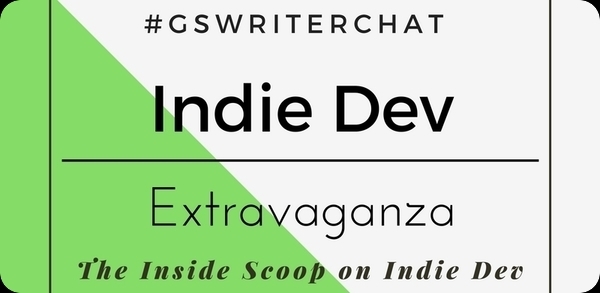
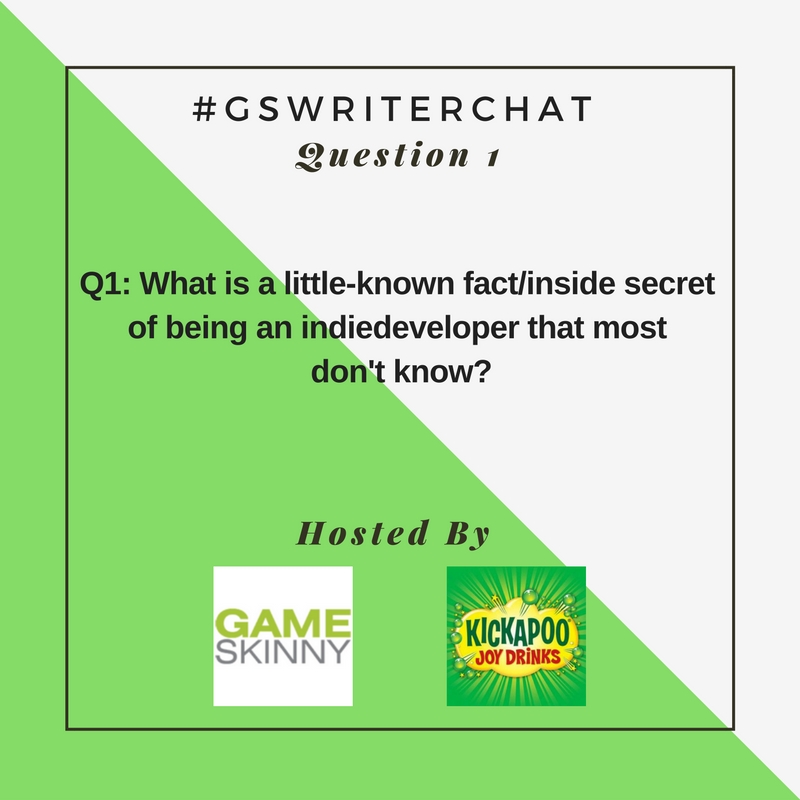

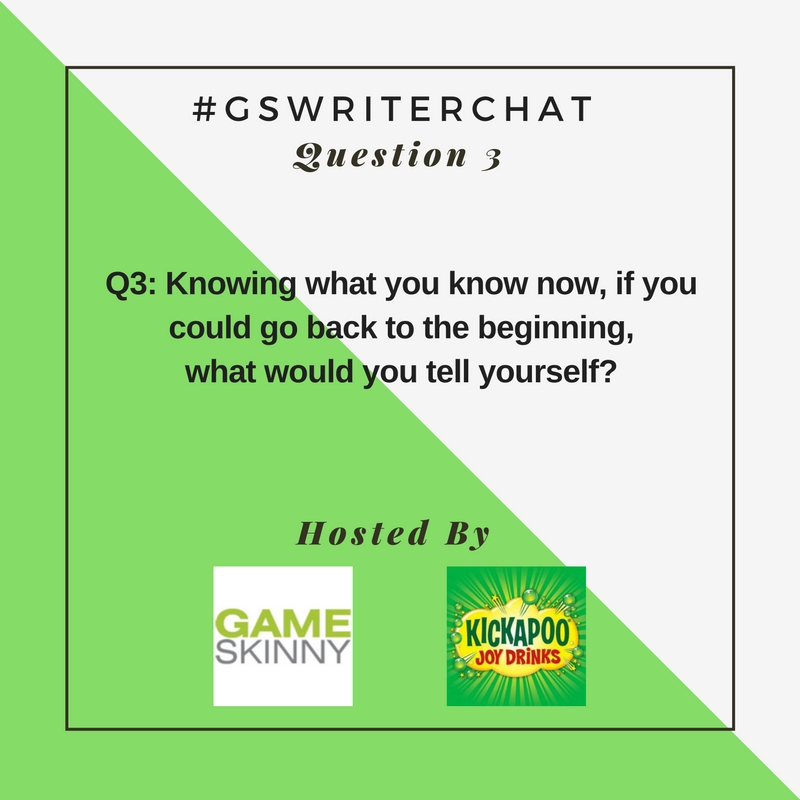


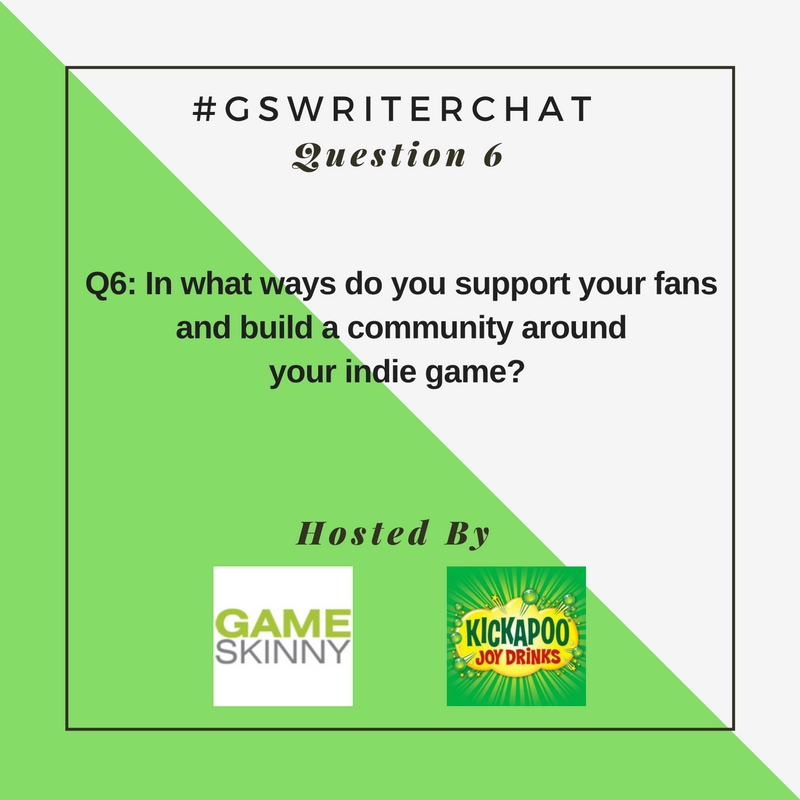
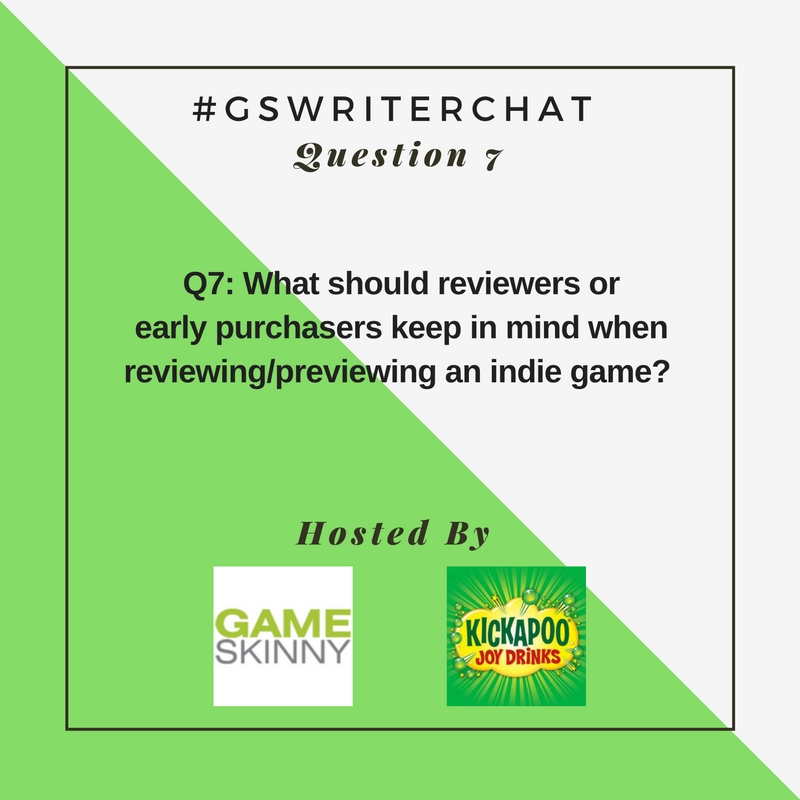

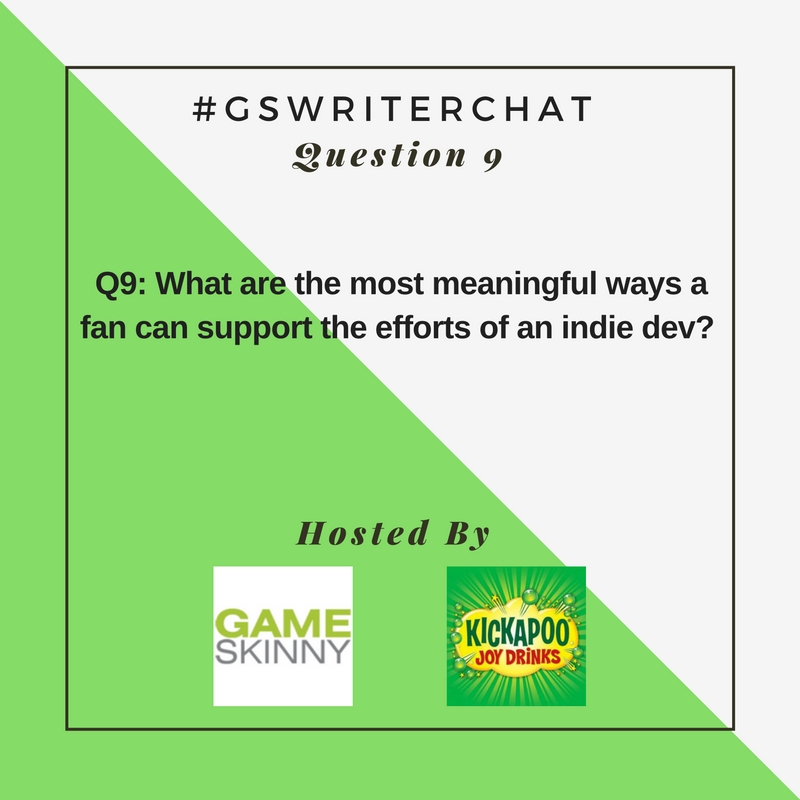
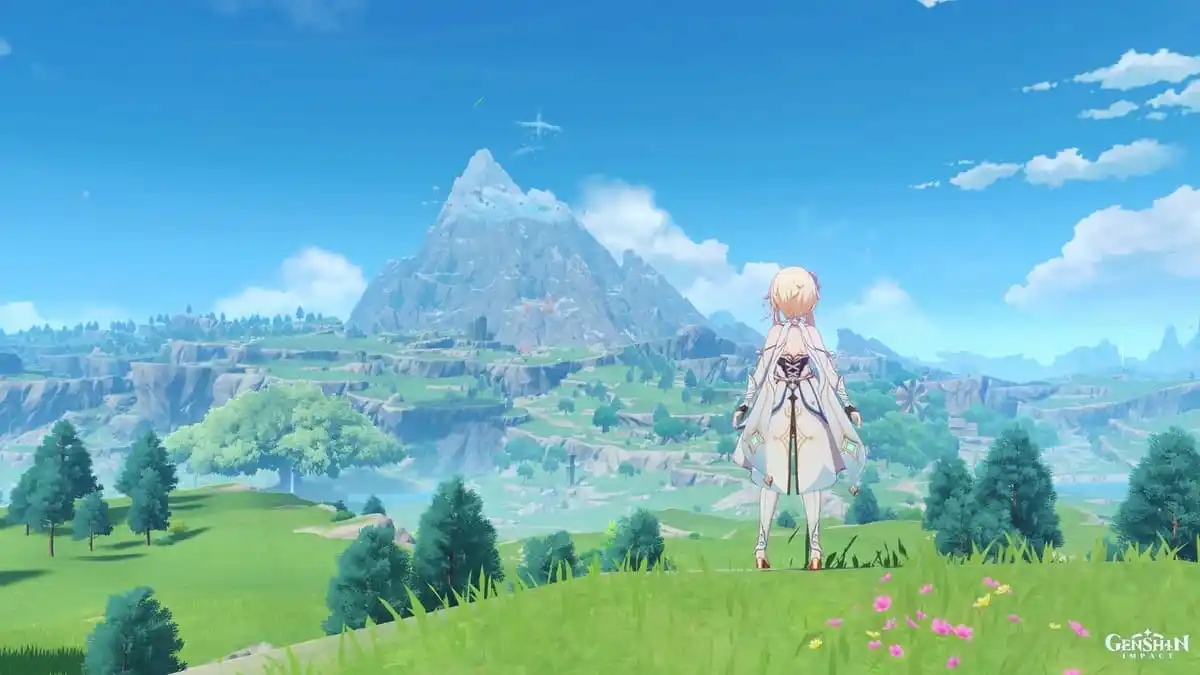



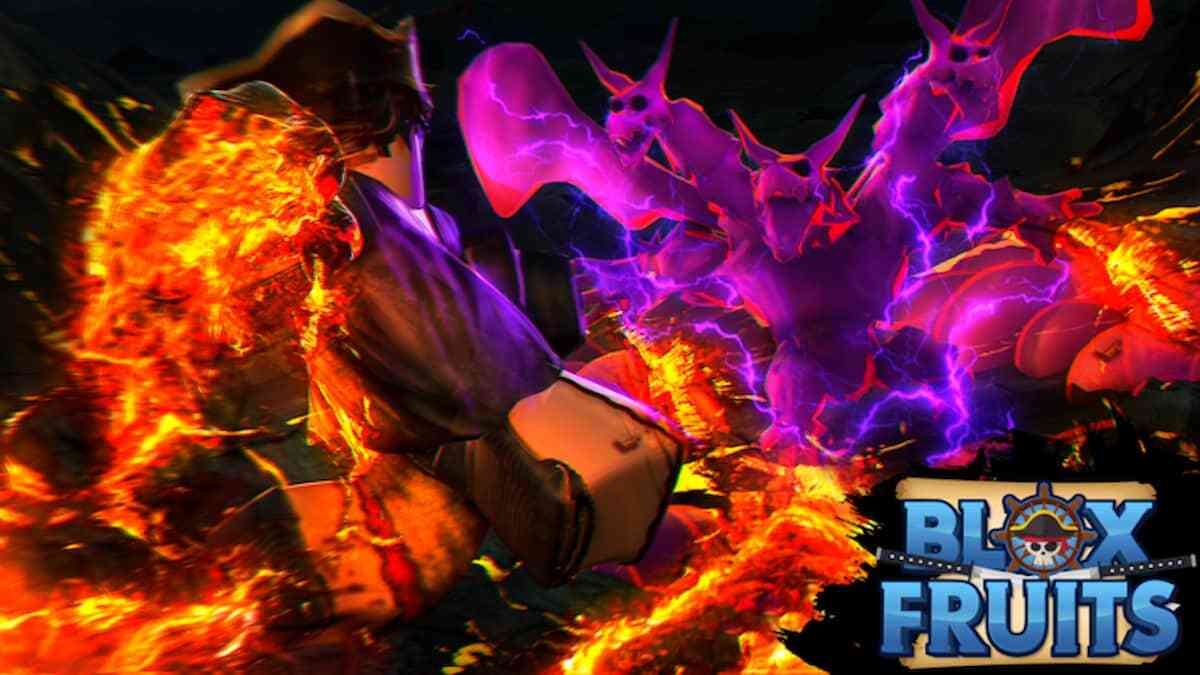
Published: Aug 29, 2016 11:00 am